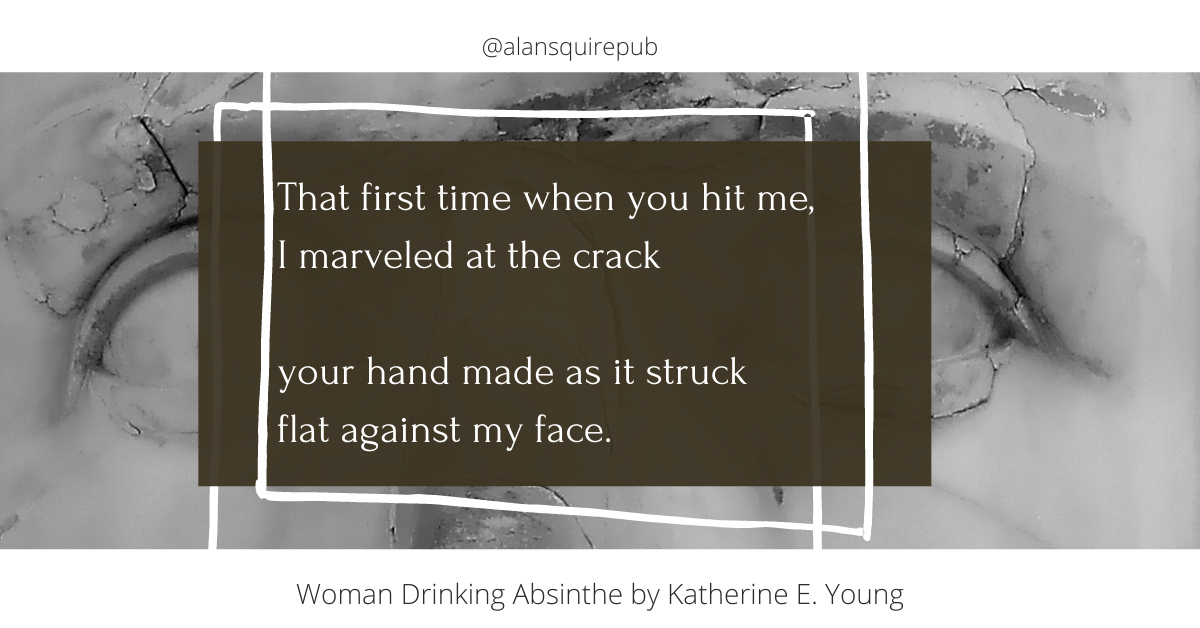WOMAN DRINKING ABSINTHE Analyzed by Billy Mills
Former Guardian Literary Journalist, Billy Mills, analyzes the conception of love in Katherine E. Young's new collection.

"Young’s core subject is love, but there’s nothing redemptive or particularly healing about its manifestations," writes Billy Mills in his analysis of Young's Woman Drinking Absinthe. Elsewhere he compares the different manifestations of this theme to coeval poets Christopher Jane Corkery and James Roome.
Mills analysis is fitting for Young's work which comes from a deeply literary place and is steeped in evocative allusion. Mills places WDA alongside the likes of Pound and Eliot in his thinking. Like these poets, Young uses unorthodox and historically informed forms and diction in her poetry.
An excerpt of Mills' analysis follows:
"The fourth (of five) sections of Katherine E. Young’s Woman Drinking Absinthe is a single sequence, ‘Place of Peace’ that takes off from a visit to the Civil War memorial at Shiloh National Military Park. The fourth section of the sequence opens with he line ‘Who doesn’t desire to be mesmerized by love?’ and ends ‘once more I fear the shadow of his hand.’ These lines could be said to serve as the twin poles of the entire collection.
For Young’s core subject is love, but there’s nothing redemptive or particularly healing about its manifestations."
The poems in Katherine E. Young’s Woman Drinking Absinthe concern themselves with transgressions. Lust, betrayal, guilt, redemption: Young employs fairy tales, opera, Impressionism, Japonisme, Euclidean geometry, Greek tragedy, wine, figs, and a little black magic to weave a tapestry that’s as old as the hills and as fresh as today’s headlines.
Talking Jazz and Rock with Poet Reuben Jackson (Laura Ritchie)
Author and music educator Lauren Ritchie sat down with ASP’s Reuben Jackson this week to talk jazz with the man himself. Reuben’s music credentials are long and impressive, from curating the Duke Ellington Collection at the Smithsonian to hosting a weekly Jazz radio show for NPR Vermont, to his poetry which takes inspiration from and frequently comments on the American Jazz idiom. Listen to or read the interview…
Rose Solari talks with Acclaimed Poet David Gewanter
This Sunday, October 21, at 8 p.m., ASP’s Rose Solari is reading with acclaimed poet, essayist, editor, and professor David Gewanter in a new poetry reading series at Second Story Books, 2000 P Street NW, Washington DC. In preparation for their reading, Rose talked with David about his work, particularly his most recent collection, Fort Necessity. Here is a part of their discussion…
Featured Audio: “Margaret in Oxford,” a Reading by Rose Solari
Robert Olen Butler loved Rose’s debut work of fiction for its sense of the eternity. This is one of many reasons why all of Rose Solari’s work must be treasured. It plays on life motifs, flips, forms, and languors upon the archetypes formed of human experience. We have spoken previously of Rose’s reverence for the myth in modern day. We even looked before at A Secret Woman’s sense of itself as being both poem and novel…

